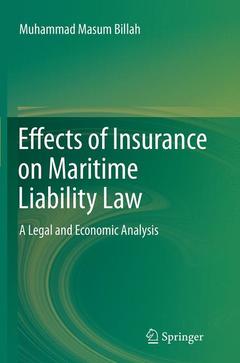Effects of Insurance on Maritime Liability Law, 2014 A Legal and Economic Analysis
Auteur : Masum Billah Muhammad

1. Introduction.- 2. Lack of Insurance and Its Effect on Maritime Liability Law: A Historical Evaluation.- 3. Insurance and Limitation of Ship owners’ Liability: An Economic Analysis.- 4. Insurance through General Average: Its Justifications and Effects on Optimal Care and on Social Costs.- 5. Maritime Cargo Liability Regimes in Light of Insurance Realities.- 6. Role of Insurance in Providing Adequate Compensation for Oil Pollution Damage and in Reducing Oil Pollution Incidents.- 7. Incentive Effect of Liability Rules in the Presence of Liability Insurance.- 8. Conclusion.
First examination of maritime liability law using a formal economic analysis approach
Explores the connection between insurance and maritime liability law
Argues that liability insurance is not a hindrance but a complementary force towards achieving the deterrent goal of liability law
Includes supplementary material: sn.pub/extras
Date de parution : 08-2016
Ouvrage de 210 p.
15.5x23.5 cm
Date de parution : 01-2014
Ouvrage de 210 p.
15.5x23.5 cm


